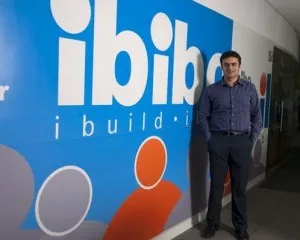No e-commerce company is evangelizing local and mobile commerce as Tradus - Ashish Kashyap, ibibo group CEO
Last year was a very promising period for Indian startup ecosystem. We saw the acquisition of redBus by Nasper-backed group ibibo and local listing site JustDial’s IPO. The Gurgaon-based ibibo group runs multiple online businesses across various verticals like travel (Goibibo and redBus), marketplace (Tradus), and payment gateway (PayU). Recently, Tradus pivoted its business model to mobile and location-based marketplace from its earlier model (online marketplace).
To understand the reasons behind Tradus pivot, redBus acquisition and PayU reach, YourStory caught up with Ashish Kashyap, founder and CEO, ibibo. Ashish spoke candidly on various aspects, including challenges in building mobile and location based marketplace, ensuring delivery within a day and possibility of Tradus merger with Flipkart. Sharing his views about outlook of e-commerce in India, he said, “Like previous year, 2014 will also see some inevitable consolidation.” Edited excerpts of the interaction:

Ys: How was 2013 for ibibo’s portfolio companies (Goibibo and PayU)?
AK: In terms of organic growth, we have built businesses like Goibibo and payment gateway PayU from scratch. Goibibo’s growth was in triple digit in the previous year with around 20% transactions happening through mobile while PayU witnessed a significant growth. At present, PayU extends gateway to more than 6,000 merchants with features like ‘All-in-One’ payment settlement solution, which reduces the payment settlement headaches of online marketplaces and aggregators.
On an inorganic front, we have acquired the country’s largest online bus ticket aggregator redBus to foster our presence in overall travel segments.
YS: Which thought processes led ibibo to acquire redBus? Can you mention any interesting anecdote?
AK: Goibibo growth has been phenomenal over two years and we sensed an increasing demand for bus tickets. Following the surge we decided to acquire a leading player in this space.
During negotiation with redBus, at one point, ibibo turned away from the deal as promoters and founders had high expectations but later things materialized smoothly and we acquired one of the finest internet businesses in India.
YS: Recently, Tradus pivoted its business model. What led to the pivot and what’s the positioning of the company now?
AK: Tradus pivoted to mobile and location based marketplace from online marketplace model. We at Tradus felt the urge of bringing real commerce (local retailers in Delhi like Lajpat Nagar, Chandni Chowk, Gaffar Market, Karol Bagh and Sadar Bazaar) online. There are two major reasons behind changing the model – proximity between buyer and seller and increasing penetration of smartphones in the country.
We started with local sellers of Delhi (including famous food of Chandni Chowk, Paranthe wali gali), Bangalore (Chickpet, SP Road, Kormangala, JP Nagar) and Mumbai (Crawford market, Lamington Road and Masjid Bunde etc.). Besides Tradus, none of the e-commerce companies are evangelizing local and mobile commerce in a big way.
YS: What were some of the major challenges Tardus faced while pivoting from online to mobile centric model?
AK: For local retailers internet or mobile is a new channel and they saw it as a cumbersome way of doing business initially. We deploy our own executives on ground to train merchants for a week and once they get used to it and see transactions (during training period) through us, they become savvy to sell on Tradus.
Besides training, we are also developing backend tools for merchants to make the process easy and hassle free.
YS: Tradus promises delivery within a day and in some cases within five-six hours. How does Tradus ensure such short-notice delivery?
AK: We leverage both in-house logistics network and third party logistic partners to meet promised deadlines. At present, we have on-ground logistic team of 55 delivery boys and equal number of bikes across Delhi (40) and Bangalore (15).
YS: Does Tradus pivot have anything to do with Nasper (Nasper owns substantial part of ibibo) investment in Flipkart?
AK: Nasper allows businesses to operate freely irrespective of multiple investments in the same vertical and geography. Our pivot has nothing to do with Flipkart or any other players. We have pivoted after identifying a big gap and more over it’s about solving a problem that no other player ever ventured into.
YS: Is there any chance of merging Tradus with Flipkart (given the common investor – Nasper)?
AK: Look we can’t predict the future. Till January last year, we never dreamt of acquiring redBus but it happened later in June. Similarly, we don’t know the future dynamics but to assure YourStory readers I can say we are not even thinking on such lines.
YS: Last month, Tradus executed a clever marketing ploy by extending huge discounts on brooms (jhadu) to woo the common man just after the Aam Adami Party’s (AAP) landslide victory in Delhi. Give us some outcomes of such campaigns and estimated investment required for execution?
AK: The campaign was suggested by a merchant from Sadar Bazaar (Delhi) and we launched it instantly. We sold out 1,000 promotional brooms at Rs.5 within a few hours. Later, other sellers from Delhi, Bangalore and Mumbai joined the campaign and buyers simply loved the flavor of the month -- ‘AAP’ symbol.
It helped us amass significant amount of downloads (almost more than double as compared to the usual period) as far as Tradus’s mobile apps are concerned. The campaign cost only a few thousand rupees which is insignificant compared to any marketing campaigns.







